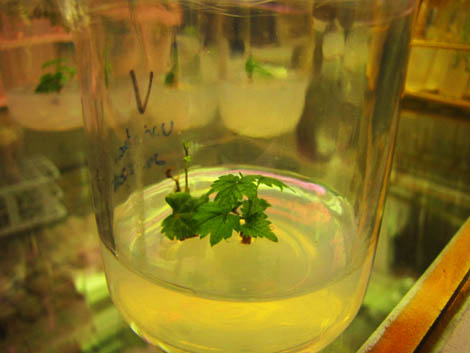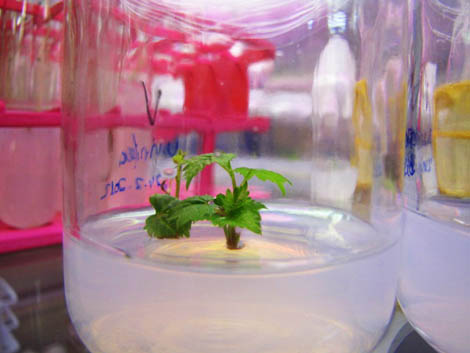 Increasing production and improving the quality of national wine and olive oil, making them more competitive in international markets, and preserving the endangered varieties and relevant national varieties (Galega) is what QualityPlant, the latest Spin- Off from the University of Coimbra (UC).
Increasing production and improving the quality of national wine and olive oil, making them more competitive in international markets, and preserving the endangered varieties and relevant national varieties (Galega) is what QualityPlant, the latest Spin- Off from the University of Coimbra (UC).
The project, already awarded as the best business idea and best proof of concept in the national entrepreneurship competition Arrisca C, is a pioneer in the country in the preservation and propagation of agroforestry species on a business scale.
Investing in in vitro culture methods (cloning techniques) for the preservation and propagation of plants, much faster and more efficient than conventional ones, the technology of QualityPlant – Research and Production in Biotechnology Vegetal, Lda, allows «not only to guarantee production of plants of high phytosanitary quality, but, essentially, to ensure the reduction of production costs for nurserymen/farmers, associated with the elimination of pests or diseases, and to improve their productivity, valuing national products and stimulating the Portuguese economy with more products. competitive, also at world level», state the founders of Spin-Off, Elisa Figueiredo and Mónica Zuzarte.

Another great bet of QualityPlant is the creation of a germplasm bank - GermplasmBank (conservation of the genetic heritage of plants), a "life insurance" for plants where producers can "keep" the germplasm of their most promising varieties, guaranteeing its preservation and future use, p. eg, in cases of natural losses (floods, droughts, pests)..
In vitro culture techniques guarantee the uniformity of the genetic heritage of plants and make it possible to obtain a large number of plants of superior quality in a relatively short period of time.
Therefore, QualityPlant's technology will “remove several limitations of conventional propagation (cutting and sowing), namely the slowness and failure of the rooting process in vegetative propagation by cutting (eg olive and citrus crops), the contamination of many species by pathogens (citrus sadness virus, grapevine black rot, olive tuberculosis, etc.) and the need for large physical space (eg tree species)», conclude the researchers at the UC.
On the other hand, the preservation of germplasm of national varieties with economic potential is an innovative bet and intends to be the great asset of the newly created company.


















Comments